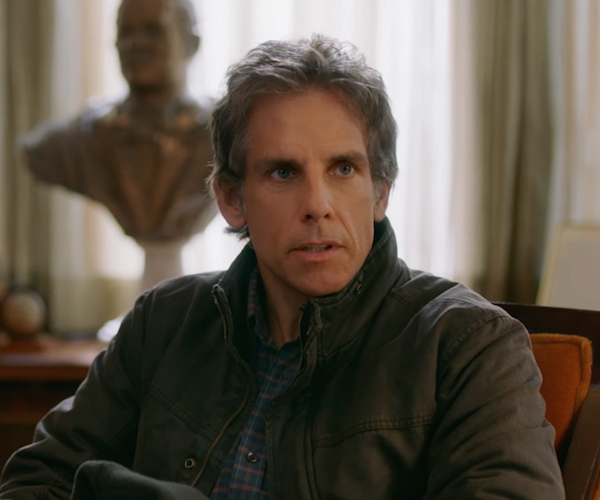Film Review: “Brad’s Status” — A Triumphant Comedy About Male Failure
This downer comedy, written and directed by the subversively talented Mike White, is a triumphant entry into the botched, washout male category of cinema.
Brad’s Status, written and directed by Mike White. Screening at the Kendall Square Cinema, Coolidge Corner Theatre, the Somerville Theatre, and AMC Loews Boston Common 19.

Ben Stiller in “Brad’s Status.”
By Gerald Peary
Male torment and failure is a great topic for an art work, and I can relate to it. But are there movie characters who match up to the great losers of stage drama: Oedipus, King Lear, Uncle Vanya, Willy Loman? I’d put at the top of my list On the Waterfront’s Terry Malloy, who could have been a champ, and Charles Foster Kane, who never got over his childhood sled, and The Searchers’s Ethan Edwards, exiled to the western frontier, forever alone.
And in the domestic sphere? Brad’s Status, a downer comedy written and directed by the subversively talented Mike White, is a triumphant entry into the botched, washout male category of cinema. The titular Brad, a middle-aged white guy in anguish about his very comfy life — he suddenly wants far more! — is played to nutty, neurotic perfection by Ben Stiller. His exemplary acting here is a companion piece to his superbly off-putting turn several years ago as the creepy, self-absorbed lead in Greenberg.
So what’s Brad’s story? He’s in charge of a non-profit in Sacramento, California. He has a middle-class existence with a mellow, idealistic wife (The Office’s winning Jenna Fischer), and a respectful, high-achieving son Troy (a stalwart performance by movie newcomer, Austin Abrams). Troy is an excellent high school student, who is applying for college in the East as a music major. Brad decides to accompany Troy to the Boston area for several campus interviews.
And then the roof implodes. Brad’s anxiety about how to pay for his son’s university starts with sleepless nights and leads him to obsessing jealously about his old college friends, who are beyond financial worries. To a man, they seem infinitely more successful than he is; and his altruistic choices in life strike him suddenly as a colossal blunder. He’s stuck in nowhere Sacramento, while his pals are making the scene in New York, LA, and Hawaii. He’s an anonymous do-gooder in unvalued work while his various friends have retired at 40 with hedge-fund wealth, directed films in Hollywood, moved with a bikini babe under each arm to the beaches of Maui, become a TV intellectual, the kind of media philosopher fawned over by Charlie Rose.
Manic with envy, weighed down by self-pity and worrying, Brad flies off for Boston with his son. And what an odd pairing. Troy is quiet, self-contained, has his head planted on solid shoulders, and seems not insecure in the least that he’ll get into the right university. He’s applied to Harvard and Tufts, and, after touring them and being interviewed, he likes things about both. In contrast, his father is still incensed, thirty years later, about being waitlisted at Yale.
Trying to assist Troy at starchy Harvard, Brad exhibits behavior both deplorable and crazy, but pretty funny for a film audience. Then filmmaker White boldly steps over the comfort line. White is willing that the protagonist gross us out, lose our good feelings for him, because of his seedy libidinous decisions. While his son sleeps in their shared hotel room, Brad sneaks out to a Cambridge tavern to make a play for Troy’s strikingly brilliant and beautiful Harvard co-ed friend, Ananya (the properly enticing Shazi Raja). They talk, he gripes. Annoyed by his self-pity and “first world” entitlement, Ananya lectures him, “You’re 50 years old and you still think the world was made for you.”
“I’m 48,” the clueless Gen-Xer corrects her.
Hail Mike White for his astute debut directing a theatrical film. Before Brad’s Status, he has a long, estimable career as a character actor and, more, a clever screenwriter, having penned both the sublime cult movie, Chuck & Buck, and the mainstream favorite, School of Rock. I loved his writing and co-starring in the eccentric 2016 TV series, Enlightened, opposite Laura Dern. And earlier in summer 2017, White succeeded again with his sharply Buñuelian, political-minded script for Beatriz at Dinner. What Beatriz and Brad have in common is the main male character (John Lithgow’s Trump-like businessman in Beatriz) exuding heterosexual, white-skin privilege. (In a telling cameo, White appears in Brad’s Status as Brad’s swishy gay Hollywood pal, shown getting married to a chubby “bear.”)
Finally a bit of local movie trivia: in the 1960s, movies like Love Story and The Paper Chase were filmed routinely on Harvard University property until one film production, A Small Circle of Friends (1980), wrecked it for everyone, putting fake snow and ice into Harvard Yard and destroying trees and grass. Since, Harvard stands strong in saying “No” to commercial cinema. That’s why, even with the might of Amazon Studios behind it, the Brad’s Status crew could only shoot outside on Mass. Ave as the characters pass through Harvard gates.
Gerald Peary is a retired film studies professor at Suffolk University, Boston, curator of the Boston University Cinematheque, and the general editor of the “Conversations with Filmmakers” series from the University Press of Mississippi. A critic for the late Boston Phoenix, he is the author of nine books on cinema, writer-director of the documentaries For the Love of Movies: the Story of American Film Criticism and Archie’s Betty, and a featured actor in the 2013 independent narrative Computer Chess.

As you probably know, Gerald, many film supposedly set at Harvard (The Paper Chase comes immediately to mind) have actually been filmed on the grounds of The University of Toronto.